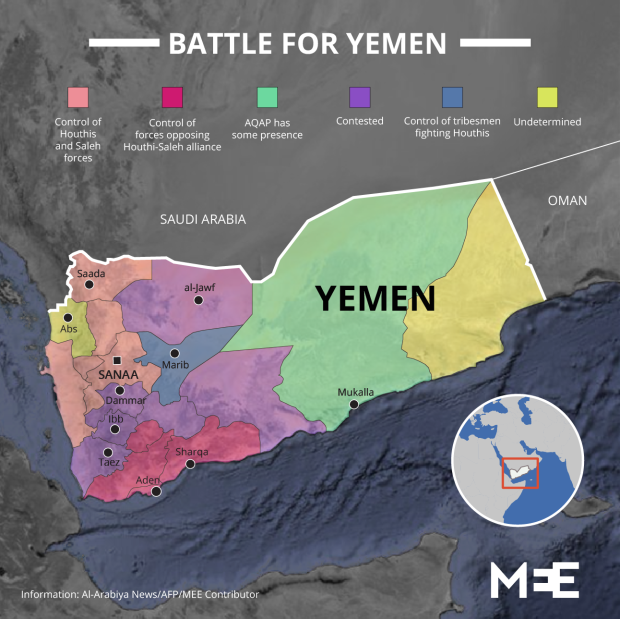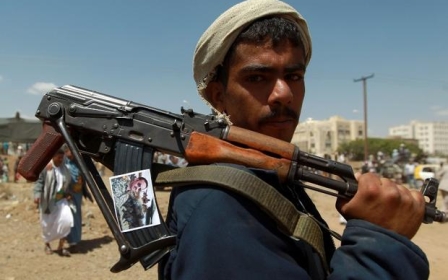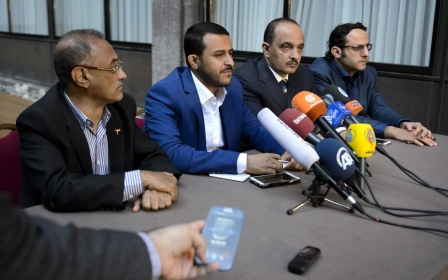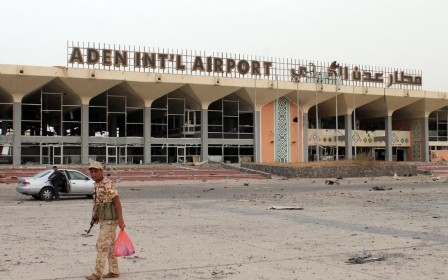Yemen's diminishing Houthi allies

Aften 10 months of Houthi rule, many of the group’s allies have abandoned the group, saying that the Houthis have not improved the situation in the country.
The Houthis took over the capital Sanaa in September 2014 with popular backing. Their backers dreamed that the lives of the impoverished would improve under a new era of economic prosperity. However, the only thing that the group has done – in the eyes of many of its former supporters – is instigate several conflicts across the country.
Abdulhameed al-Otimi, 28, a former Houthi supporter, told Middle East Eye: "When the Houthis took over Sanaa, I thought that [they] would eliminate corruption from governmental institutions, but they didn't do anything in this regard. Then I realised that all the Houthis can do is is fight and they don't have any plans for development."
Al-Otimi participated in several of pro-Houthi protests in Sanaa throughout 2014, but after a dispute with his boss, he lost his job for outward support of the Houthis.
In the past month, al-Otimi stopped supporting the Houthis, "The Houthis had time to build the country, but they did nothing but damage it, and now it [is] the proper time for them to leave Sanaa and return to their stronghold in Saada."
New MEE newsletter: Jerusalem Dispatch
Sign up to get the latest insights and analysis on Israel-Palestine, alongside Turkey Unpacked and other MEE newsletters
Throughout this year, many businesses have closed because of the economic crisis that followed Yemen’s ongoing war. Unemployment is at an historic high.
War over rebuilding
Ali Abulohoom, a journalist who fled Sanaa for Saudi Arabia in May, told MEE: "The Houthis lost their supporters because they do not feel [the] people's suffering."
The so-called revolution began on 18 August 2014 as Houthi militias capitalised on the widescale protests against a government-implemented removal of fuel subsidies.
Abulohoom said he supported the Houthis at the time because they wanted to eliminate the sheiks' ability to extort the government and private companies.
He added that he had lost confidence in the Houthis after they had waged wars in so many regions.
"Violence is the only way that the Houthis can understand [things]. They don't know what they are doing; they want to keep fighting and invade provinces until they take over the whole country."
Collusion between Houthis and ex-president Saleh
The relationship between Houthi militias and the ex-president Ali Abdullah Saleh became clear when Saleh loyalists began fighting shoulder to shoulder with the militias.
Dr Nabil al-Sarjabi, a political science professor at Hodeida University and an expert on crisis management, told MEE that the Houthis don't know how to manage the country, and added that they are acting like a tool for Saleh.
"Saleh wanted to use the Houthis to eliminate his opponents that ousted him in 2011," al-Sharjabi said.
He went on to say that Saleh did not help the Houthis with managing the government because he does not want them to take over the country - he wants them to fight his opponents.
Hundreds of Houthis fighters have been killed in the war in Aden and Taiz provinces, but the Saudi-backed “Popular Resistance” movement has freed Aden from the Houthis, while clashes are still ongoing in Taiz.
Al-Sharjabi confirmed that what is happening today is the opposite of last year’s developments: "Last year, Houthis gradually took control of several provinces, but today they are losing their supporters and leaving the provinces gradually."
However, Houthi activist Hussien al-Boukhaiti denied that the Houthis had lost their supporters, saying that the mass protest on Tuesday against "the foreign occupation" was a clear indication that their forces remain strong.
"We can say that Ansarallah [Houthis] lost control of some areas in the south but we cannot say that the Houthis have lost their supporters," al-Boukhaiti said.
Even if al-Boukhaiti denied that the Houthis have lost their supporters, talk to anyone in Sanaa, and they will say that Houthi support used to be strong, but today it has dissipated greatly.
Middle East Eye delivers independent and unrivalled coverage and analysis of the Middle East, North Africa and beyond. To learn more about republishing this content and the associated fees, please fill out this form. More about MEE can be found here.





